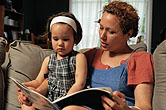

Brain scans reveal that preschoolers whose parents read to them regularly show more activity in key areas of their brains.
Reading to young children is well known to have benefits, including better language skills. And experts already urge parents to have a regular story time with their kids, starting at birth. It’s been assumed that the habit feeds youngsters’ brain development.
But the new findings, published online Aug. 3 in the journal Pediatrics, offer hard evidence of that theory.
“It’s often said that reading builds brains,” said study leader Dr. John Hutton, of Cincinnati Children’s Hospital Medical Center. “That seems obvious, but you want to show that it’s actually true.”
So Hutton’s team used functional MRI scans to measure real-time brain activity in 19 children, aged 3 to 5 years, as they listened to stories and to sounds other than speech.
Parents were interviewed about “cognitive stimulation” at home, including how often they read to their children. Based on their responses, the number ranged from two nights a week to every night.
Overall, Hutton’s team found, the more often children had story time at home, the more brain activity they showed while listening to stories in the research lab.
The difference was seen in a brain region involved in so-called semantic processing — the ability to extract meaning from words. There was “particularly robust” activity, the researchers said, in areas where mental images are formed from what is heard.
Hutton said that finding is especially intriguing, because reading to children is assumed to spark their imaginations.
“When children listen to stories, they have to put it all together in their mind’s eye,” Hutton explained.
Even though children’s books have pictures, he added, that’s different from watching all the action play out on a TV or computer screen.
Brandon Korman, chief of neuropsychology at Nicklaus Children’s Hospital, in Miami, agreed.
When a child is listening to a story, rather than sitting passively in front of a screen, the brain is in a “more active” state, said Korman, who was not involved in the research.
But he also pointed to a question the study cannot answer: Are these differences in preschoolers’ brain activation actually related to their literacy later in childhood?
“That would be a next logical step in this research,” Korman said.
Regardless, he added, the findings still “definitely reinforce” the importance of reading to your children.
As it stands, the American Academy of Pediatrics advises parents to read to their children every day, starting at birth. That pre-kindergarten time is a critical time for brain development, Hutton said. Other research has found that children with poor reading skills in first grade usually do not “catch up” with their peers.
But is there something special about old-fashioned books, versus the reading apps many toddlers are now using on smartphones and tablets? Both Hutton and Korman said it’s not clear whether reading from a device could have different effects on young kids’ emerging reading skills.
However, Korman added, some researchers have voiced concerns that if young children spend too much time on devices, that could take away from human interactions that teach them about empathy, problem-solving and other critical life lessons.
That human connection, Korman said, is one of the reasons it’s so important to read to your child. “The benefits go beyond their cognitive development,” he said.
Hutton agreed that a traditional story time provides a critical “back-and-forth” between parents and children.
“It’s not just a nice thing to do with your child,” he said. “It’s important to their cognitive, social and emotional development.”
More information
The American Academy of Pediatrics has more about early reading and literacy.
Source: HealthDay
Copyright © 2024 HealthDay. All rights reserved.

Leave a Reply